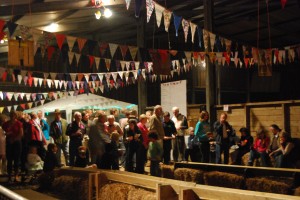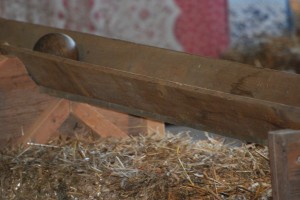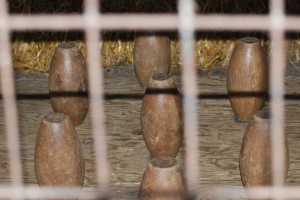 Una vez al año, los dueños de una pequeña explotación agropecuaria en Luckett, al este de Cornualles, celebran un concurrido campeonato de “skittles” en su granero, no solo para recaudar dinero para su pequeña comunidad sino como una forma de reunir a los vecinos y estrechar lazos de amistad. Para mi suerte el campeonato fue ayer, recién llegada a Luckett, y por supuesto no me lo iba a perder. El carnicero del pueblo era el encargado de la barbacoa y otro ancianito lugareño el de las bebidas. Además del campeonato de bolos, por supuesto hubo rifa también.
Una vez al año, los dueños de una pequeña explotación agropecuaria en Luckett, al este de Cornualles, celebran un concurrido campeonato de “skittles” en su granero, no solo para recaudar dinero para su pequeña comunidad sino como una forma de reunir a los vecinos y estrechar lazos de amistad. Para mi suerte el campeonato fue ayer, recién llegada a Luckett, y por supuesto no me lo iba a perder. El carnicero del pueblo era el encargado de la barbacoa y otro ancianito lugareño el de las bebidas. Además del campeonato de bolos, por supuesto hubo rifa también.
Skittles, es un juego de bolos tradicional inglés, típico de pubs y posadas, con unas reglas y terminología muy específicas. El juego consiste en lanzar una bola de madera a lo largo de una galería para intentar derribar nueve bolos o skittles.

El juego de los bolos,en sus diversas modalidades, se ha venido practicado desde tiempos remotos en Europa. Se trata de un deporte de origen rural que se practicaba al aire libre en lugares públicos (junto a las iglesias, en la calle, etc.) y que constituía una oportunidad de ocio y de relación de la población local.

En España la variedad y riqueza del juego de bolos también es muy extensa, y de hecho la consideración de este ancestral juego como un valioso patrimonio cultural en España, y en toda Europa, es la base de muchos proyectos de cooperación para recuperar y conservar los juegos tradicionales como patrimonio cultural y recurso turístico.
Términos empleados en “Skittle”:
Ball – the wooden ball rolled at the skittles.
Beaver – when a player knocks down no pins in a hand.
Birdy – Worcestershire term for the pin in the centre of the frame, immediately behind the front pin. Also known as «bird in the cage» or the «Landlord».
Broken frame – a frame with some pins knocked over
Cheese – a round, flattened wooden discus (often made of lignum vitae), shaped like some types of cheese, which in some variants of the game is thrown instead of rolling a ball. It may also be rolled, like the oblate ball used in the game of bowls.
Copper – the pin on the extreme left or right of the frame. The pin at the front of the frame, also known as the king pin .
Cush – the rails on either side of the alley, usually made from timber. Some alleys have ditches/gutters instead (similar to ten pin bowling).
Cush ball – a ball that is bowled & hits the cush. In most variants of the game the pins that are then knocked down are not counted in the players score (see also sidey)
Down – the scores for all players in one set during a single hand, combined, e.g. «we just got a 24 down»
Duck – a player who doesn’t knock down any pins on their turn.
Flattener – a ball that knocks down all nine pins.
Flopper – when a player knocks down all nine pins with one ball or cheese.
Flopper ball – the ball that achieves a flopper
Foul – a ball delivered illegally over the foul line
Frame – the full set of pins (usually nine) standing upright
Hand – a player’s turn at the game
Hill gap – The Gap between the front pin and the front quarter pin
King pin – The pin at the front of the frame. Also name of type of skittles where front pin has to be floored before any pins count
Landlord – the pin in the centre of the frame, immediately behind the front pin. Also known as «bird in the cage».
Line – the mark on the alley that denotes where the ball must be delivered (before the line in Worcestershire, in – between two lines in Bristol etc)
Leg – known as a set elsewhere comprising 6, 8, 9, 10 or 12 players.
Over – same as foul.
Pin – a skittle.
Strike – hitting over all the pins within one turn.
Good strike – Denotes when after the first ball the remaining Pins stood up are able to be knocked down with the second ball for a spare
Pitch – the long rectangular strip along which balls are thrown and at the end of which the pins stand
Plate – the strip on the floor which the balls have to hit when they leave the skittlers’ hands. In Bristol and North Somerset the plate is the square which the pins are stood on.
Quarter – the two pins to either side and behind the front pin
Set – three or four players who play against the opposing teams set
Sidey – a ball played that hits the side of the alley.
Skittle alley – a long narrow building in which skittles is usually played.
Skittle may be an onomatopoeic word that describes the noise made when the skittles fall.
Spare – when a player knocks down all nine pins with 2 balls, allowing a third throw with the pins re-set.
Split – The pins left after the first ball has been played.
Spider (Worcestershire) – when a player fails to knocks down any pins in a hand with her or her three balls.
Sticker or sticker-up – a person who puts knocked-over pins back upright
Sunshine (New South Wales) – same as spider
V/c – used to denote a beaver or sunshine when chalking, also an alternative for those names in North Somerset – said to stand for «very close»
Spot – The marks on the plate which the pins are placed
Wraxall 8 (north Somerset) – used to denote when a player scores 8 with the front pin still standing
Winger (Worcestershire) – Either of the two pins at the extreme right and left of the frame.
